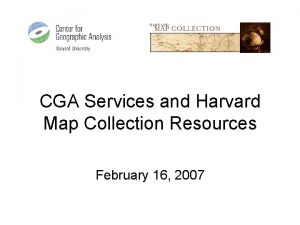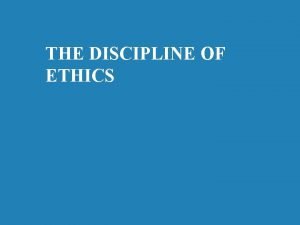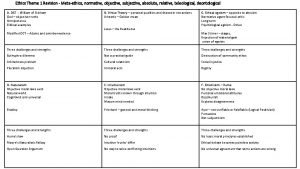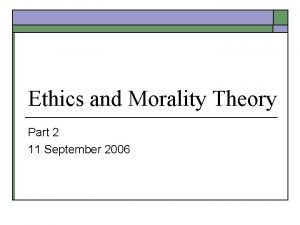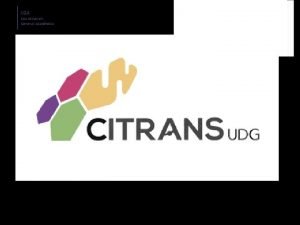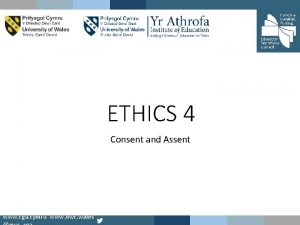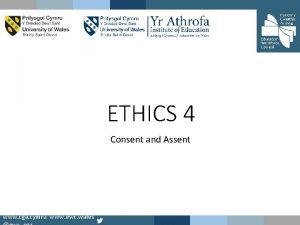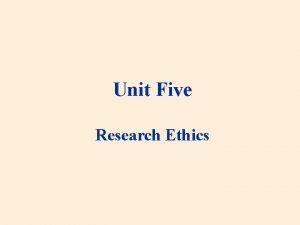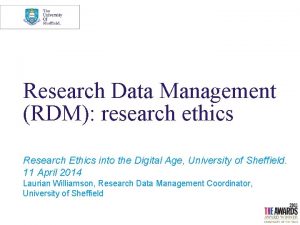ETHICS 2 Ethics in education research www cga






![Ongoing decision-making about ethical behaviours • Ethical decision-making …[is]… an actively deliberative, ongoing and Ongoing decision-making about ethical behaviours • Ethical decision-making …[is]… an actively deliberative, ongoing and](https://slidetodoc.com/presentation_image_h2/609cd4f1c438c5eab03a448a34ec2b83/image-7.jpg)







- Slides: 14

ETHICS 2 Ethics in education research www. cga. cymru www. ewc. wales

Do I need ethical approval? • In schools and other education settings we might ask whether we need ethical approval when our research is related to developing our teaching practice (our pedagogy) • All research requires you to consider the ethical implications; when you are asking participants to do or provide anything that is in addition to normal classroom activity then usually you need to seek ethical approval • If you are undertaking research with a Higher Education Institution or are being funded by a research body, you will need to ask about their approval processes • Registrants who are successful in receiving an EWC bursary will require ethical approval from the EWC ethics panel prior to commencing their research project www. cga. cymru www. ewc. wales @ewc_cga

Equality Act (2010) • A person (A) discriminates against another (B) if, because of a protected characteristic, A treats B less favourably than A treats or would treat others. o Protected characteristics - age - disability - gender reassignment - race - religion or belief - sexual orientation • Research activity may be considered a breach of the equality act if you have not sought and been given ethical approval to proceed • Think about the scenario on the next slide www. cga. cymru www. ewc. wales @ewc_cga

Scenario • Alex is a year 2 teacher and is keen to find out what the children in the school think about a new physical exercise routine that she has piloted across the school as part of a research project aiming to improve children’s fitness. • Alex asks a diverse group of children from Y 1 to Y 6 to meet her at lunchtime for a short discussion, she includes a range of children with different characteristics to hear as many viewpoints as possible. • The following day two parents ask to speak to the headteacher to ask why their children were kept in at lunchtime. They raise their concern that the school has discriminated against their children because they are two of the very few children from an ethnic minority background in the school. • Had Alex contravened the Equality Act? Why /why not? www. cga. cymru www. ewc. wales @ewc_cga

Behaving ethically • ‘Behaving ethically’, or adopting an ‘Ethic of respect’ might be considered to be a professional characteristic • ‘Applying an ethic of respect may reveal tensions or challenges. For example, there will usually be a need to balance research aspirations, societal concerns, institutional expectations and individual rights’ BERA 2018 p. 5 • Following ethical guidelines for education research can help us navigate ethical issues in our research – and, possibly, in our practice • ‘Ethical practice in research involves thoughtful reflection about how one ought to proceed in any given situation … it is more than simply the avoidance of being unethical or conforming to regulations’ Mc. Ginn 2014 p. 159 www. cga. cymru www. ewc. wales @ewc_cga

Ethical guidelines • British Education Research Association (BERA) guidelines 2018 • BERA’s guidelines unequivocally recognise and celebrate the diversity of approaches in educational research, and promote respect for all those who engage with it: researchers and participants, academics and professional practitioners, commissioning bodies, and those who read and utilise the research. They are not rules and regulations, but they do represent the tenets of best ethical practice that have served our community of researchers well in the past and will continue to do so in the future. (p. ii) www. cga. cymru www. ewc. wales @ewc_cga
![Ongoing decisionmaking about ethical behaviours Ethical decisionmaking is an actively deliberative ongoing and Ongoing decision-making about ethical behaviours • Ethical decision-making …[is]… an actively deliberative, ongoing and](https://slidetodoc.com/presentation_image_h2/609cd4f1c438c5eab03a448a34ec2b83/image-7.jpg)
Ongoing decision-making about ethical behaviours • Ethical decision-making …[is]… an actively deliberative, ongoing and iterative process of assessing and reassessing the situation and issues as they arise. (p. 2) • BERA’s guidelines set out ethical considerations with regard to various stakeholders in the research process. Taking an hour to read the BERA guidelines (2018) is strongly recommended! o See also: Ethics and Educational Research, British Educational Research Association on-line resource. Hammersley, M. and Traianou, A. (2012) www. cga. cymru www. ewc. wales @ewc_cga

BERA guidelines • The BERA guidelines include consideration of the researcher’s responsibilities to participants such as: • Consent (See ETHICS 4) • Transparency • Right to withdraw • Incentives • Harm • Privacy and data storage (See ETHICS 5) • Disclosure www. cga. cymru www. ewc. wales @ewc_cga

Transparency • ‘Researchers should aim to be open and honest with their participants … avoiding nondisclosure unless their research design specifically requires it’ p. 16 Consider: Tomos is interested in emotional literacy and children’s social skill development. His inquiry is about how children are negotiating their friendships and social interactions during play, when adults are not directing activity. Tomos wants to know his Reception class children play and interact in the popular play area situated in the transition space between indoor and outdoor provision. He is rarely able to spend time there as he tends to work with children in focus task areas. He decides to video record the children’s activity in the transition area for two hours a day for a week, and then review this in his PPA/research time. Tomos is not sure whether to tell the children as he worries this may change the behaviour he is interested in capturing. • What should Tomos do? • What are the ethical considerations here? www. cga. cymru www. ewc. wales @ewc_cga

Right to withdraw • ‘Researchers should recognise the right of all participants to withdraw from the research for any reason or no reason, and at any time, and participants should be informed of this right’ p. 18 • Consider: Gwen’s research interest is in KS 2 children’s numerical reasoning skills; she is working with a cluster of teachers and shares her research findings with them. Gwen is using some new online mathematics games to develop her Y 5 children’s numerical reasoning skills. She is able to review the numeracy tracking scores for her class to find out whether these games improve the children’s scores, but she also wants to know whether the children like the number games and are motivated by them to improve. As part of her research Gwen decides to give the whole class a written questionnaire about their experiences of mathematics and then to invite children to talk to her in a group interview. She makes the questionnaire part of her teaching plan for the day, and asks for volunteers to spend 15 minutes at lunchtime talking to her. • How does Gwen ensure the children can withdraw from being part of her questionnaire data collection process if they wish? • How does Gwen ensure that children who volunteer to talk to her know that they can leave part way through if they wish? • How does Gwen ensure the children know that if they don’t want to take part nothing bad will happen to them? www. cga. cymru www. ewc. wales @ewc_cga

Incentives • ‘Use of incentives should be commensurate with good sense, such that the level of incentive does not impinge upon the free decision to participate’ p. 19 Consider: Beth’s Y 7 class are competitive, they often compare the numbers of reward stickers they have. These stickers are used by staff across the school to commend behaviour and effort. Twenty reward stickers can be exchanged for a voucher to spend in a popular local store. Beth has decided to offer ten reward stickers to children in her class who take part in a focus group discussion at lunchtime to discuss an aspect of the school that she is researching as part of a cluster research project. She is surprised when all the children volunteer. • Have the children made a free choice to take part in the research? • Should Beth reconsider her approach? www. cga. cymru www. ewc. wales @ewc_cga

Harm • Researchers should ‘aim to both put participants at their ease and avoid making excessive demands on them … the more vulnerable the participants the greater the responsibilities of the researcher for their protection’ p. 19 • Researchers should ‘consider the impact of their research on the lives and workloads of participants, particularly when researching vulnerable or over-researched populations’ p. 20 Consider: • Small population groups – children, parents, teachers - in the school who may be asked to participate in a number of projects because the project leads aim to include all groups in the school www. cga. cymru www. ewc. wales @ewc_cga

Disclosure • Researchers should consider carefully the situations in which they may need to break the confidentiality or anonymity agreements they have with participants; for example revelations of illegal activity or abuse. • There is a statutory duty to report revelations of abuse or terrorist activity, and these override ethical agreements about confidentiality and anonymity. • Read Resource 2, which is the two sections from the BERA guidelines about this issue. www. cga. cymru www. ewc. wales @ewc_cga

Ethics panels • An ethical approval panel or ‘ethics panel’ is usually a group of people, with good collective understanding of research ethics, who meet to discuss the ethical implications of research proposals • The ethics panel will consider the researcher’s proposed actions in meeting the ethical implications • The panel can usually approve, conditionally approve or reject applications • A conditional approval means that the researcher must make some changes in order to receive approval to undertake their research www. cga. cymru www. ewc. wales @ewc_cga
 Cga age
Cga age Cga interclub
Cga interclub Harvard map collection
Harvard map collection Cga interclub
Cga interclub Tarjeta cga
Tarjeta cga Sam 3001 östergötland
Sam 3001 östergötland Mattan mansoor
Mattan mansoor Descriptive ethics
Descriptive ethics Realism vs anti realism
Realism vs anti realism Micro and macro issues in engineering ethics
Micro and macro issues in engineering ethics Descriptive ethics vs normative ethics
Descriptive ethics vs normative ethics Metaethics vs normative ethics
Metaethics vs normative ethics Descriptive ethics vs normative ethics
Descriptive ethics vs normative ethics Beneficence examples
Beneficence examples Meta ethics vs normative ethics
Meta ethics vs normative ethics


